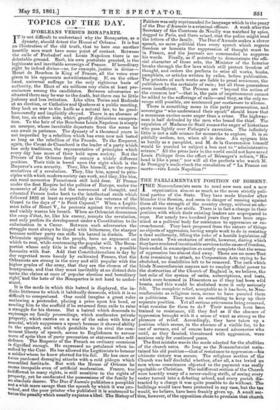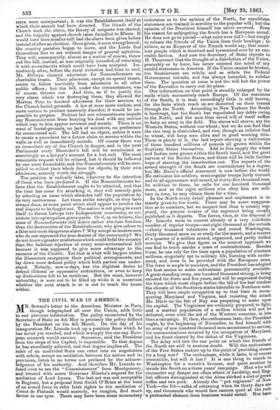THE P ARLIAMENTARY POSITION OF DISSENT. T HE Nonconformists seem to need
new men and a new organization almost as much as the more strictly poli- tical parties of the State. They have made blunder after blunder this Session, and seem in danger of rousing against them all the strength of the country clergy, without an ade- quate reason for the strife. There is in fact a change in their position with which their existing leaders are unprepared to cope. For nearly two hundred years they have been orga- nized as a political body for resistance to oppression or en- croachment. They have proposed from the nature of things no objects of aggression, having ample work to do in resisting a dead uniformity, lifting the yoke of a hostile legislation off their necks. Two centuries of strife, however, during which theyhave rendered inestimable services to the cause of freedom, have ended in emancipation so nearly complete that the sense of oppression has almost died away. There are no more Test Acts remaining to attaek, no Corporation Acts crying to be abolished, no disabilities left to be removed. The oath which binds Nonconformist mayors not to employ official power to the destruction of the Church of England is, we believe, the last relic of the system of oaths, subscriptions, and tests, which once hemmed in Dissenters as if. they had been wild beasts, and this would be abolished were it only seriously felt. The complete relief, acceptable as it has been, to Non- conformists as religious men, seems to have puzzled them as politicians. They must do something to keep up their separate position. Yet all serious grievances being removed, what remains for them to do ? Their muscles have been trained to resistance, till they feel as if the absence of oppression brought with it a sense of want as strong as the pleasure of relief. Accordingly, they have taken up a position which seems, in the absence of a visible foe, to be one of menace, and of course have roused adversaries who until, as they fancied, threatened with aggression, were anxious only for continued peace. The first mistake was in the mode adopted for the abolition of the church rates. So long as the Nonconformist main- tained his old position—that of resistance to oppression—his ultimate victory was secure. The religious section of the Church was half doubtful whether, after all, a tax levied on men whose consciences objected to the payment was really equitable or Christian. The indifferent section of the Church were heartily weary of a never-ending strife, of seeing every vestry turned into a debating school, and every parish dis- tracted by a charge it was quite possible to do without. The buildings would have been protected in any case, but the tax would, we believe, have been frankly given up. A small sec- tion, however, of the opposition chose to proclaim that church rates were unimportant ; it was the Establishment itself at which their assault had been directed. The friends of the Church took the alarm, the theory of outposts was started, and the majority against church rates dwindled to fifteen. It would have been smaller still had the alarm been given before instead of after an election. Once given, it soon strengthened ; the country parishes began to move, and the Lords find themselves free to act without danger of general agitation. They will, consequently, almost as a matter of course, throw out the bill, instead, as was originally intended, of returning it with amendments which could have been accepted. Im- mediately after, before the rural irritation had time to cool, Mr. Dillwyn claimed admission for Nonconformists on charitable trusts. Their admission, except on special trusts, seems to follow inevitably from admission to all other public offices ; but the bill, under the circumstances, was of course thrown out. And then, as if to justify the very alarm which was destroying them, they allowed Sir Morton Pete to demand admission for their services to the Church burial-grounds. A law at once more useless, and more certain to produce unseemly disorder, it would be im- possible to prepare. Neither law nor circumstances impede any Nonconformist from burying his dead with any service which may to him appear reverent and seemly. There is no want of burial-grounds, no lack of ministers, no preference for consecrated soil. The bill had no object, unless it were to create a precedent for a future claim to service within the walls as well as immediately outside. Of course there was an immediate cry of the Church in danger, and in the next Parliament every Dissenter's bill will be scrutinized as searchingly as a lawyer's account for a lost suit. The most reasonable request will be refused, lest it should be followed by one more formidable, and the Norconformists will be com- pelled to collect their Whole force for objects, by their own admission, scarcely worth the struggle. The position is radically false, whatever be the intention of those who have produced it. If the Nonconformists be- lieve that the Establishment ought to be attacked, and that the time has come for attacking it, they will scarcely gain by selecting an issue which alienates half the population by its very narrowness. Let them strike straight, as they have always done, at some point which shall appear to involve the real dispute to be fought out. The nation is not going to exert itself to thrust bishops into Independent cemeteries, or mi- nisters into episcopalian grave-yards. Or if, as we believe, the mass of Nonconformists still desire rather absolute freedom than the destruction of the Establishment, why give colour to a false and most dangerous alarm ? Why accept as leaders men who do not represent the true desires of the community? We do not know a greater misfortunewhich could befal the country than the habitual rejection of every semi-ecclesiastical bill because it was supposed to give some advantage to the enemies of the Church. Yet that is what will happen unless the Dissenters reorganize their political arrangements, and lay down some defined policy which both parties can under- stand. Nobody, now-a-days, has the slightest desire to defend illiberal or oppressive restrictions, or even to keep up distinctions felt to be invidious. But the moat, however unhealthy, is sure not to be filled up while it is uncertain whether the next attack is or is not to reach the house within.































 Previous page
Previous page